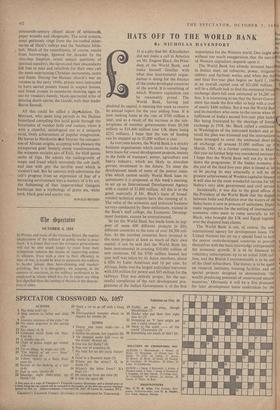HATS OFF TO THE WORLD BANK
By NICHOLAS DAVENPORT As everyone knows, the World Bank is a strictly business organisation which exists to make long- term loans for sound development projects, mainly in the fields of transport, power, agriculture and heavy industry, which are likely to stimulate private investment in the future. To meet the development needs of some of the poorer coun- tries which cannot satisfy World Bank loan re- quirements it is proposed, at this week's meeting, to set up an International Development Agency with a capital of 51,000 million. All this is to the good, especially if Mr. Black's team of broad- minded technical experts have the running of it. The value of the economic and technical business surveys conducted by these enthusiasts, trained in the Bank's staff college, the Economic Develop- ment Institute, cannot be overestimated. - So far the World Bank has made loans in sup- port of some 600 different projects in fifty different countries to the tune of over $4,500 mil- lion. As the member ,countries have invested in the same projects at least as much of their own capital, it can be said that the World Bank has been instrumental in creating $10,0130 million of new resources. Of the $700 million loaned last year half was taken by its Asian members, about a fifth by Latin American and 16 per cent. by African. India was the largest individual borrower with $50 million for power and $85 million for the railways. That was entirely proper, for the suc- cessful completion of the vast development pro- gramme of the Indian Government is of the first
importance for the Western world. One might s without too much exaggeration that the surviv of Western capitalism depends upon it.
The World Bank has already invested heavil in Indian steel, oil refineries, power, irrigatiol railway and harbour works, and when the thie and final five-year plan begins on April 1, 196 at an overall capital cost of $21,000 million, will be a difficult task to find the estimated forei exchange short-fall now estimated at $4,200 nu lion. It is interesting to see that the Soviet Gover ment has made the first offer to help with a cred of nearly $400 million. But it was the World Ban and its members who came to the rescue when th fulfilment of India's second five-year plan looke like being frustrated by the shortage of foreig exchange in 1958. Mr. Black called a conferenc in Washington of the interested lenders and as result' the plan was trimmed and the internationa loans arranged to cover the estimated short-fal of exchange of around $1,000 million up t March, 1961. At a further conference in Marc this year no further help was considered necessar I hope that the World Bank will not try to slo down the programme. If the Indian economy 3 the end of the third five-year plan is found at Ins to be paying its way externally it will be th greatest achievement of Western capitalist financ It will also be the most wonderful success for Me Nehru's very able government and civil service
Incidentally, it was due to the good offices of the President of the World Bank that the dispute between India and Pakistan over the waters of the Indus basin is now in process of settlement. Diplo• matic negotiations for the settling of international economic rows seem to come naturally to Mr. Black, who brought the UK and Egypt togethel over the disputed Suez claims.
The World Bank is not, of course, the onl) international agency for development loans. The United Nations.has set up a special fund to help the poorer underdeveloped countries to provide themselves with the basic knowledge indispensable for economic growth. It is to be financed bY voluntary subscriptions up to an initial $100 mil- lion, and the British Commonwealth is to be one of the chief subscribers. The money is to be spent on research institutes, training facilities and on special projects designed to demonstrate 'the wealth-producing potential of unsurveyed natura resources.' Obviously it will be a fine promote for later development loans undertaken by the
orld Bank. The European Common Market untries have also set up a Development Fund ith a capital of $500 million, whose directors re now considering an ambitious plan put for- ard by M. Monnet for the raising of the standard f living in countries still below the poverty line. here is also an American Development Bank. lid a Commonwealth Development organisation all witnesses to the stirring of the Western con- ir at the sight of the appalling poverty in the nderdeveloped parts of the world.
There is one thing which is worrying me and thers brought up in the Keynesian school-- the increasing financial cost of these development loans. The World Bank is charging 6 per cent, to borrowers plus a fee to cover overheads and a reserve against losses. The Bank has itself to bor- row in the world's financial markets at the market rate—pledging the uncalled subscriptions of the US, UK, Canada, Germany, etc., as collateral for its loans—and if world rates of interest are to rise, dear money will make the development pro- jects of the poorer countries uneconomic. The prosperous rentier must not be allowed to hold up the salvation of the starving half of the world.
(Cti.stos is on holiday)







































 Previous page
Previous page